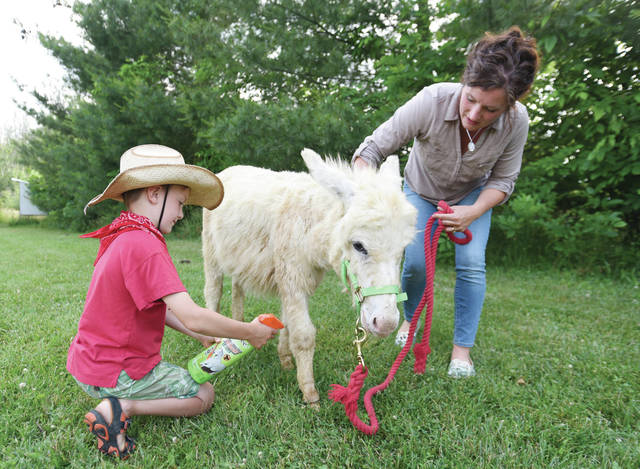
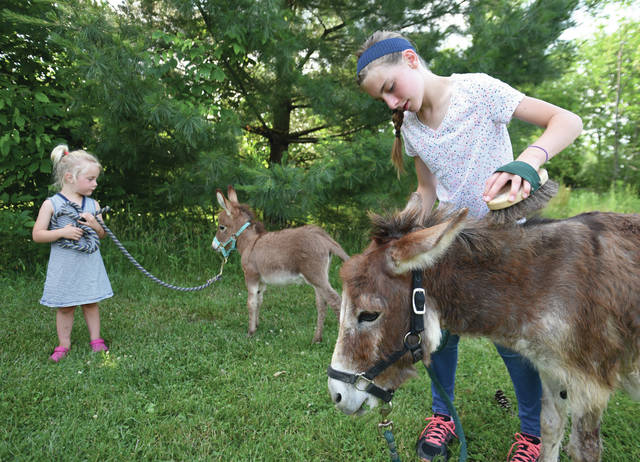
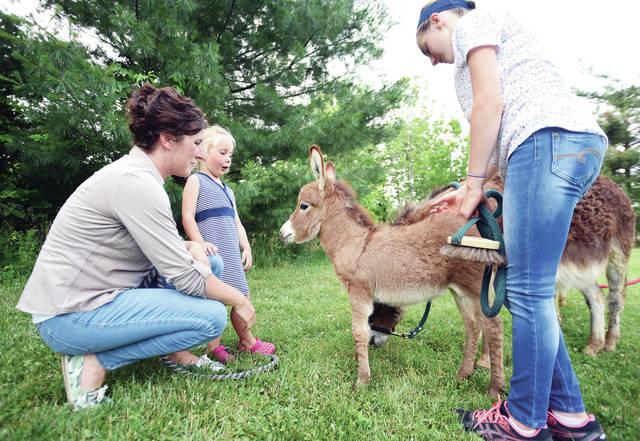
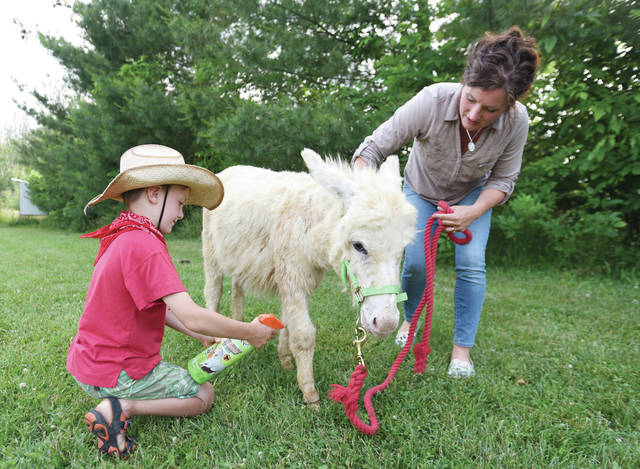
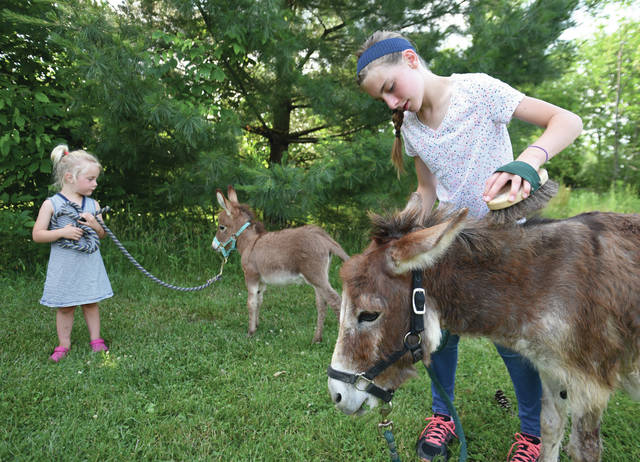
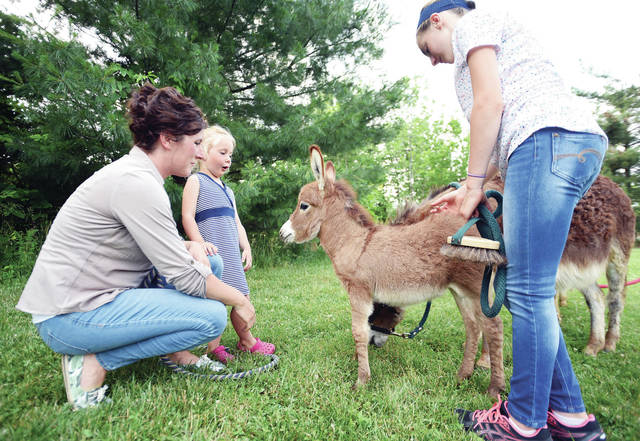
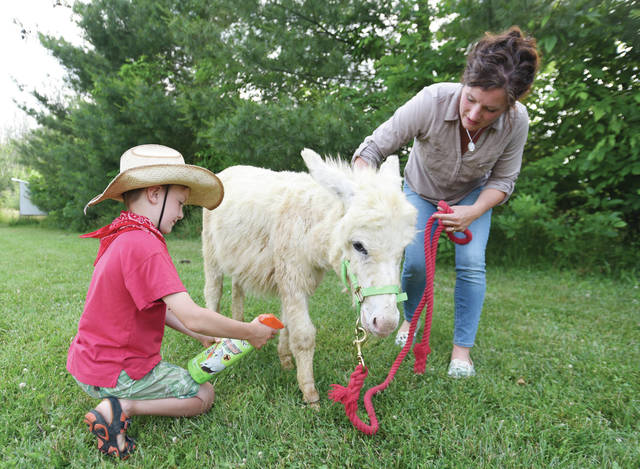
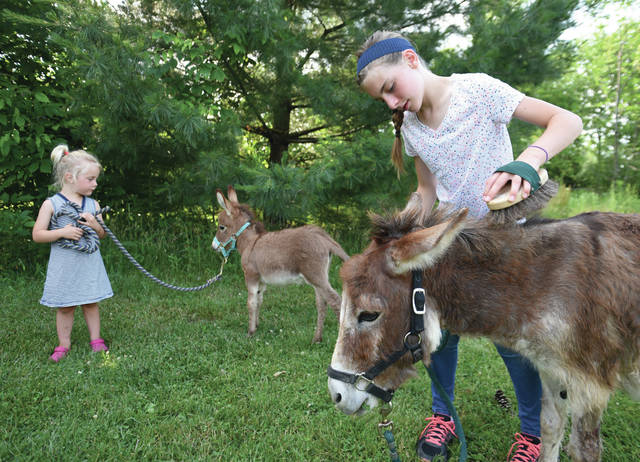
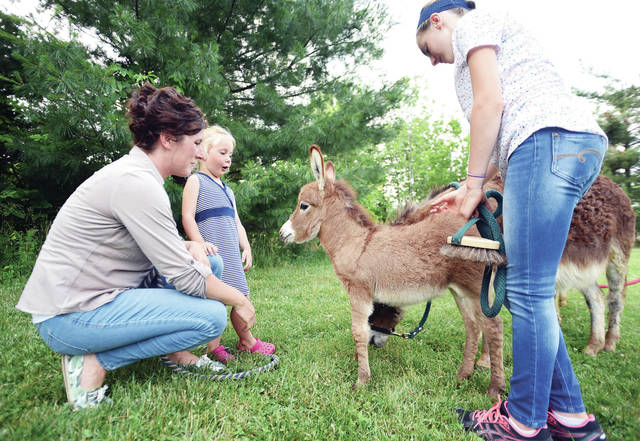
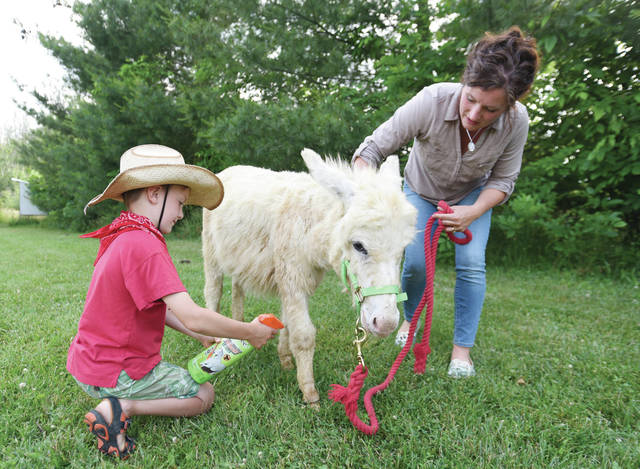
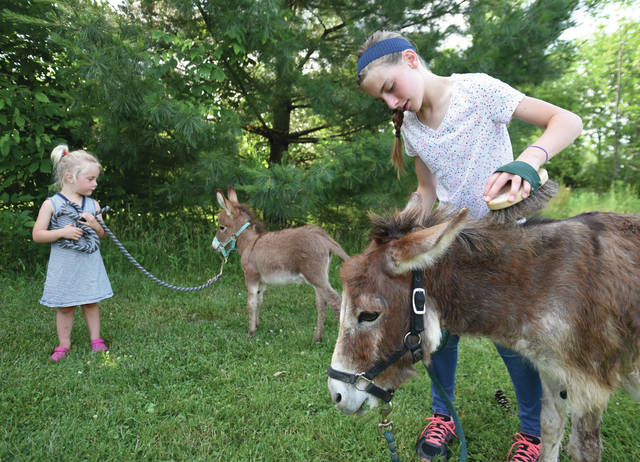
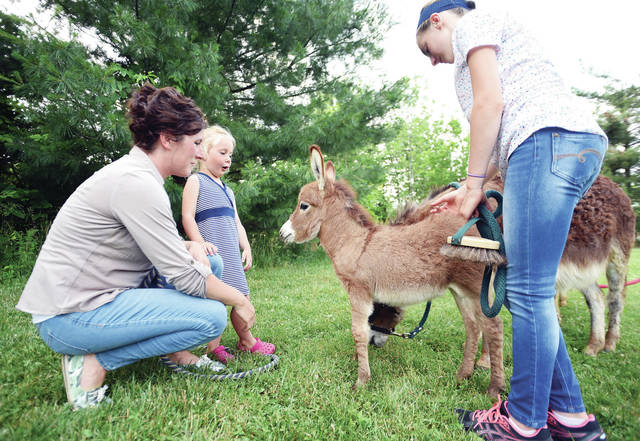
FORT LORAMIE — Erica Schmiesing and her husband, Joe, now of rural Fort Loramie, knew even when they were living in Sidney that they wanted animals.
City ordinances limited them to four chicks and a garden.
“That was the beginning of our livestock,” Schmiesing said. They moved to the country three years ago, and their menagerie has grown to include many more than four chickens, two pigs and a duck.
And, oh yes, the seven miniature donkeys.
Why donkeys?
“My husband had had goats. He didn’t like the way they taste. He didn’t like their milk. I wanted a cow,” but the family likes to travel and having a cow prevents that, Joe said. It was a wooden statue of the Holy Family, with Mary perched on one, that gave Erica the idea of donkeys. When she began to research them online, she discovered that miniature Mediterranean donkeys have been growing in popularity in the U.S. since they were first imported from Sardinia in the 1920s.
“They can pull a cart. Children can ride them, show them. People do trail rides with them, pack them. People use them as therapy animals,” Schmiesing said. “We have them primarily as pets. It’s like owning a dog but without the burdens of dog ownership. They’re small. They live outside.”
She noted that all but one of their herd are registered, which means they meet a breed standard. Therefore, in addition to pets, the animals can be bred and their offspring sold. A foal born just two weeks ago will be sold.
Eventually, the family may enter donkey shows. Currently, the Schmiesings take the donkeys to various special events. The next one will be Camp Courageous in Miami County, a camp for children who have lost loved ones. And the animals will make an appearance at the Holy Angels Parish Picnic. But, Schmiesing said, “for now, breeding good stock is No. 1.”
She found her first donkey, an unregistered gelding, on Craig’s list.
“A gelding is a safe place to start,” she said. Online sources had suggested that having a sole donkey isn’t good. Donkeys need companions. Schmiesing didn’t pay a lot of attention to the suggestion, but soon found out that the Internet was right.
So Providence Cottage Farm, which includes children Thomas, 13, Rosemarie, 11, Leopold, 9, Bruno, 7, Iohanna, 4, and Rupert, 1, acquired another gelding.
“They were good buddies. They played together. They sparred. I thought it would end with two geldings,” Schmiesing said.
And then Joe found a jennet. Female donkeys are called jennets. Male breeding donkeys are called jacks.
“If we’re going to breed, we should look into good donkeys,” Joe said. They visited a breeding farm.
“And all these donekeys came up to us,” Schmiesing said. They bought a jennet.
The gelding, named Anton, came home in a truck. The jennet came home in the back of the family’s SUV.
“We learned a lot from the breeders. I’ve found that donkey breeders are genuine people. They take you under their wing,” Schmiesing said.
She also has learned from her son, Thomas, then 10, who kept looking back at Anton when they were taking the donkey home.
“His eyes are like caramel,” Thomas said. Back at the farm, Thomas threw his arms around Anton’s neck and said, “Oh, Mom, I’m so happy.”
Now, along with Anton, Lapanto, Spice Cake, Texas Black Gold, Holly Dandy, Lolek and JJ keep the family happy and busy, too.
The Fort Loramie herd lives outside even in the winter. As long as the animals have a dry shelter, they can withstand even subzero temperatures. Schmiesing feeds them grass hay.
“Nothing too rich,” she said. “They’re desert creatures.” Just as camels store fat in their humps, donkeys store fat in their necks.
“You can’t overfeed them. You have to practice self-restraint when it comes to treating them with carrots or apples,” she added. “Patience and self-restraint, they teach us all.”
The small equines — from 30 inches to 36 inches at the withers — are sociable. Schmiesing’s come crowding to the fence line when a visitor appears. She encourages pats and pets.
“There’s a lot of you that goes into raising these creatures and makes you want to share them with other people. We’d been reading books about hobby farm animals for years. You can’t eat (donkeys) or milk them. So they’re a beast of burden and a loving pet,” she said.
Eventually, the second gelding was sold because the Schmiesings want their herd to be about breeding. But Anton, now 16, is still at the farm. Donkeys live to be 30 to 40 years old.
“They’ve brought such joy to our family,” Schmiesing said. “They’re such a mellow, patient creature. People just want to keep being present. It’s hard to just be present today, and I think donkeys allow that.”
These owners are members of the National Miniature Donkey Association and the American Donkey and Mule Society. On the website of the former, there is a claim that miniature donkeys “bring joy and delight to the lives of all who encounter them.” Schmiesing thought, “That’s stretching it. But we brought them home, and that’s true.”
Especially in the winter, caring for them isn’t always easy.
“You have to be deliberate and thoughtful. But you can be having the worst day, and you go out to shovel manure or brush them, and the problems all go away,” she said. “You can even teach them to smile.”
That is reciprocal. It takes only one visit to learn that miniature donkeys teach people to smile, too.




